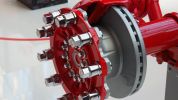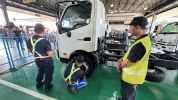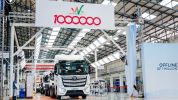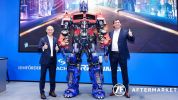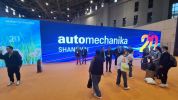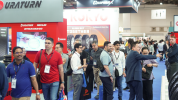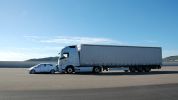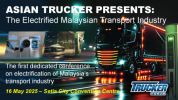The Star's strategy, in China for China
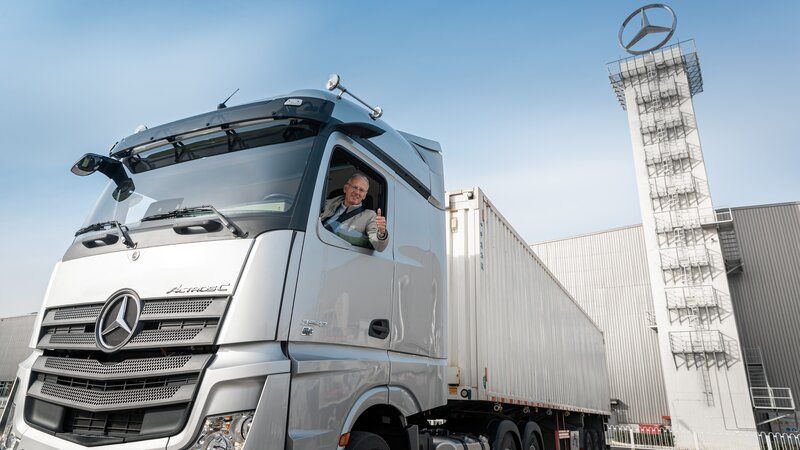
By: Gieanenrico Griffini
To be competitive on the sales side, to understand customer needs, to seize the great opportunities offered by the most important truck market in the world and to ride the emerging trends, some European manufacturers have decided to locate the production of their latest models in China. Scania and Mercedes-Benz have done so in the recent past. The Star, in particular, began in 2016 a plan to localise production of Actros, which materialised in 2022 with the inauguration of a production plant in the Huairou district, on the north-eastern outskirts of Beijing, with an installed capacity of 60 000 vehicles per year. The construction of the plant involved a total investment of 3.8 billion yuan, or about 480 million euro. The new product platform, built on site, includes models from the Actros and Actros C ranges.
The Actros Made in China is equipped with the latest generation of the in-line-six OM 471 offered rated at 450 hp, 480 hp and 530 hp in combination with the automated Powershift 3 gearbox, while the Actros C is powered by Cummins (available units have a displacement 12 or 13 litres) in combination with the 12-speed ZF TraXon gearbox. In an exclusive interview with Dr. Holger Scherr, President and CEO, and Head of the Mercedes-Benz Business Unit at the joint-venture between Daimler Truck and Foton in China - BFDA, Beijing Foton Daimler Automotive, Allestimenti & Trasporti was able to delve into the Star's strategic plans, and long-term targets for meeting the challenges of the Chinese market.
A&T: The claim adopted by Mercedes-Benz is Made in China for China. Have you succeeded in offering the 'right' product for the domestic market?
Scherr: Mercedes-Benz Truck has a long history in China, dating back perhaps a couple of decades. The original plan was to be a successful brand as an importer of heavy vehicles. This business developed positively, but we were moving into a niche market, the segment of hi-tech, very complex vehicles. We are still in this segment, but we realised that we had no chance of entering the volume-sector. In other words, remaining in a niche segment was not enough for our brand, which aspires to a leading position globally. Only with a direct market presence we could achieve this goal and understand the needs and demands of local operators in order to offer them the 'right' product. We started by offering the Actros C 6x4 tractor version. Although the two ranges - Actros and Actros C - differ from each other, both have the DNA of Mercedes-Benz vehicles, i.e. they are reliable, quality products. These are the basic characteristics of our brand, to which we add superior drivability. The other essential element is fuel efficiency, which is crucial for the specific business case. And if a vehicle is reliable and efficient, it also retains a high residual value.
A&T: How is the truck market evolving in China?
Scherr: The changes taking place are very rapid and important. Chinese operators have realised that a large percentage of the growth in gross domestic product depends on logistics. If the latter is more efficient, the economy is more competitive. So there are big investments in this sector and in infrastructure. Then there is the underlying regulatory framework, which is also evolving. If we look at emission limits, for example, Euro VI and China VI are basically identical. But China has superior standards for on-board diagnostics, which sends real-time operating data to state control bodies. This is something that does not exist in other markets. In the past, most long-distance vehicles belonged to owner-operators, who personally drove the truck and owned it. Now the sector has become more professional with the advent of fleets. For the latter, purchasing decisions are finalised in different ways. Structured companies think about making sensible investments, which take into account more than just the purchase price of the vehicle. When we arrived here, we had to find the 'right' product placement. Our target market is not the entire truck sector in China. We target professional investors who are looking for reliability with high annual mileage. It is the market for express shipments, with fast and uncompromising delivery times, temperature-controlled transport and the handling of dangerous goods. But we are also interested in the general cargo segment. We are not, however, present in other segments, such as bulk transport of raw materials or steel. In any case, we must have an in-depth knowledge of the market, which we can only achieve with a direct presence on site. Our Actros C 6x4 has a different wheelbase than the European models. It is suitable for combinations with a total weight (GCW) of 49 tonnes and has undergone a thorough optimization process of the driveline (fine tuning). It has two tanks, one for winter diesel (a fuel that is not easy to find and 15 percent more expensive) and one for summer diesel, equipped with a heating system. But that is not enough. In China, drivers are used to having a window at the rear wall of the cab. All these aspects have to be taken into account. In China we have long distances - even 2 000-3 000 km along major communication axes - which require larger tanks of both diesel (even 1 000 litre) and AdBlue. The drivers - there are often two of them - live longer in the cab, as the total mileage are up to 300 000 km, in some cases even 400 000 km per year, instead of the 130-150 000 km typical in Europe. With these operating conditions, drivers must have USB sockets in the 'right' place. They are, in fact, all digitalized and the mobile phone is very important for communication, payments and much more. Finally, companies in the sector have slim profit margins. Another element, this one, to take into account.
A&T: One last question. How will the premium segment you are targeting change?
Scherr: We are in China to ensure a long-term presence. To do this, we must have everything available that is required by the market. Of course, we will not return to the record registration figures of the past. We are now facing a replacement market, with vehicles that last longer. If China moves towards trucks with alternative drivelines, we will certainly have them. Within a decade or so, diesel engines will tend to disappear. And we will have the 'right' product to replace them. In China, the regulators are more technology open than in other countries. With this in mind, they do not give us guidelines on what to do. We have to be proactive. And for the long haul missions we believe in the role of fuel cells.
